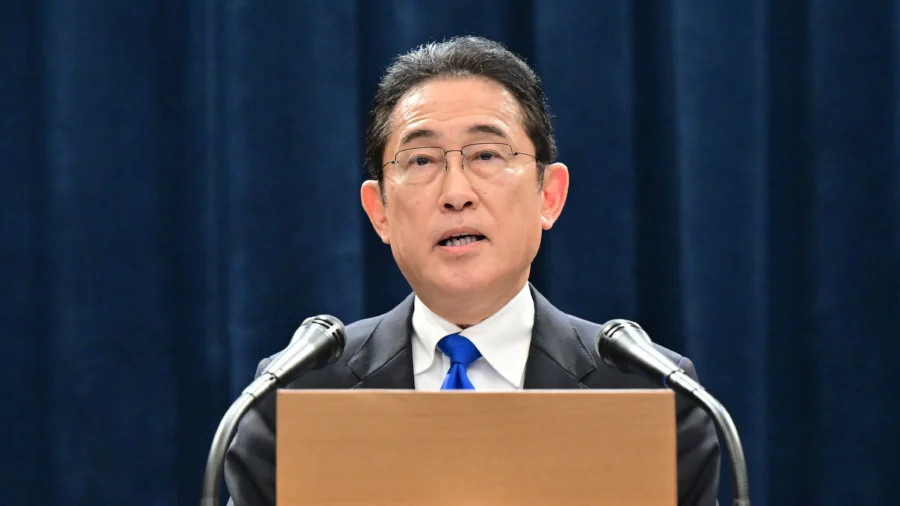In a pivotal meeting at the APEC summit in San Francisco, Japanese Prime Minister Fumio Kishida confronted Chinese leader Xi Jinping with a series of pressing issues, marking a notable shift in the Japan-China relationship. Mr. Kishida’s stance advocated for a “constructive and stable Japan-China relationship,” reshaping their bilateral ties.
The meeting, held on Nov. 16, was the first between Mr. Kishida and Mr. Xi in a year, extending 20 minutes beyond its scheduled 65 minutes. Mr. Kishida, commemorating the 45th anniversary of the Japan-China Peace and Friendship Treaty, emphasized the joint responsibility of both nations, as significant regional and global powers, to contribute to world peace and stability.
Mr. Kishida proposed reciprocal cooperation in areas like economics, cultural exchanges, environmental sustainability, energy conservation, and healthcare, contingent on safeguarding legitimate commercial activities. He acknowledged the recent establishment of a direct maritime and aerial communication hotline between Japanese and Chinese defense authorities to underscore the importance of security dialogue.
However, Mr. Kishida expressed concern regarding the situation in the East China Sea, particularly the area around the Senkaku Islands, known as the Diaoyu Islands in China. He urged China to remove buoys illegally placed in Japan’s exclusive economic zone and voiced apprehension over the CCP’s increased military activities near Japan, including its joint exercises with Russia.
The tensions in the Taiwan Strait were also a focal point of discussion. Mr. Kishida stressed the importance of peace and stability in the strait for the international community and Japan. He also called for the release of Japanese citizens detained in China on espionage charges.
Addressing the contentious issue of Japan discharging treated nuclear water into the ocean, Mr. Kishida urged the CCP to make science-based decisions and lift the import restrictions on Japanese seafood. He also raised concerns about human rights issues in China.
Mr. Kishida emphasized the need for continuous leader-level dialogue and crisis management. “It is precisely because we face challenges that active dialogue between leaders is essential for managing our bilateral relations,” he stated.
In response, Mr. Xi initially withheld concrete responses, only conceding to dialogue after persistent questioning by Mr. Kishida.
Japan’s Shift in China Strategy
The notion of a “strategic reciprocal relationship” between Japan and China, initially proposed by former Japanese Prime Minister Shinzo Abe during his 2006 visit to China, was formalized in the 2008 Japan-China Joint Statement on Advancing a Strategic Reciprocal Relationship. This concept aimed to foster mutually beneficial cooperation, peaceful coexistence, and elevate Japan-China relations to a new level.
Over time, however, Japan’s perception of the CCP and its strategic priorities evolved, prompting a shift in the bilateral relationship’s framework. This shift underpinned a more assertive stance against China by Mr. Kishida.
In the “Diplomatic Bluebook 2020” released by the Japanese government, the term “strategic reciprocal relationship” was noticeably absent in the section on Japan-China relations. The document, while recognizing economic and cultural ties, highlighted concerns over CCP actions that contravened international law, including incursions into the territorial waters and airspace around Japan’s Senkaku Islands.
Initially envisioned in a different era with optimistic prospects, the “strategic reciprocal relationship” policy has been overshadowed by the CCP’s actions, which have diverged from the policy’s intent and prompted Japan to reassess this diplomatic positioning.
The “Diplomatic Bluebook 2021” further underscored Japan’s apprehensions. It pointed out the CCP’s opaque military expansion and efforts to unilaterally alter regional dynamics as key international challenges. The document expressed deep concern over the National Security Law in Hong Kong and the CCP’s human rights violations, undermining the “one country, two systems” principle.
In this edition, the Japanese government plainly stated the existence of numerous issues with the CCP, including territorial sovereignty violations, and the intent to resolve these through negotiation. The terms “stable” and “constructive” replaced “strategic” and “reciprocal,” emphasizing the importance of a stable Japan-China relationship for both nations, the region, and the wider international community.
The “Diplomatic Bluebook 2022” detailed the CCP’s growing assertiveness and military advancements, highlighting these developments as significant security threats to Japan and the global community. It also noted challenges to universal human values posed by the CCP.
This edition reinforced the Japan-U.S. alliance as the cornerstone of Japan’s foreign policy and security, especially critical in the current challenging regional security landscape.
Regarding China, the Bluebook acknowledged the complex nature of the Japan-China relationship, citing issues like the CCP’s unilateral actions in the East China Sea. Japan’s response, as outlined, would be measured yet firm. The document reiterated the significance of Japan-China relations for regional and global peace, with Japan advocating for responsible actions from China to establish a “constructive and stable Japan-China relationship.”
From The Epoch Times

